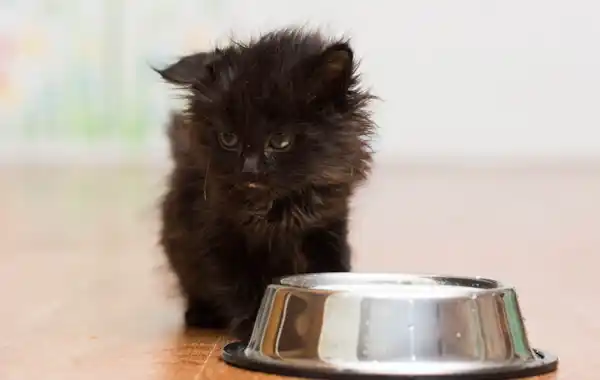Are you wondering what is the best way to approach feeding your kitten? There's a lot to know, including how often to feed your kitten and what type of food is best.
When it comes to feeding your kitten, our advice is to start as you mean to go on, opting for a good quality diet and getting into the habit of knowing exactly how much he needs - that way you can avoid him becoming overweight later in life.
Kitten's first meal
Weaning your kittens (the transition to solid food from their mother's milk) can be started from around three to four weeks of age, and is usually completed by the time the kitten reaches eight weeks of age. Their first meals are usually wet food, but could also be moistened dry kibble.
Before bringing your kitten home, find out what food he has been fed and buy a supply of the same. A sudden change of diet, combined with the stress of travel, leaving his mum and siblings, and adjusting to a new home, is likely to cause an upset stomach. If you want to change your kitten's diet, allow him time to settle, then do it very gradually, mixing the new food with your kitten's usual food.
What should you feed your kitten? ![What should I feed my kitten]()
A good quality commercial kitten food will provide your little one with the right balance of nutrients he needs; it will be formulated to cater to his specific nutritional needs. As kittens need specific amounts of proteins and carbohydrates to grow, we always recommend feeding them specially formulated kitten food. If the food label says 'complete' this means it contains everything your kitten needs to stay healthy. If it is marked 'complementary', then it should be fed with other foods.
A kitten's taste in food is influenced by what his mother ate and enjoyed. However, cats' tastes in food are as individual as they are - some kittens will grow up to enjoy a variety of foods, others will prefer either dry or wet food, while some will be keen to try human foods. Dry food has benefits for your cat's dental health. Wet food provides your cat with vital liquid intake and can be useful for mixing in some medications if he is a reluctant pill-taker. Fresh foods, such as cooked chicken, can be good for boosting a lacking appetite and are easy on the tummy in times of illness.
Can you give your kitten milk?
Never give your kitten cow's milk as it is likely to cause diarrhoea as cats are unable to digest lactose. If you wish to feed milk, buy one specifically formulated for cats in the pet aisle of a supermarket.
Kittens should happily drink water. Offer a couple of bowls in different places in the house, and wash and refresh each bowl daily. If your kitten does have a bad reaction to something he's eaten, be aware that diarrhoea which persists for more than 24 hours requires veterinary attention.
How much to feed your kitten
Follow the instructions on the packaging carefully and weigh food before you put it into his bowl. It's a good idea to get into this habit of using a measuring scoop, that way everyone in your household will feed him exactly the same amount and, as he grows older, he won't gain too much weight.

How often to feed your kitten
Kittens have small stomachs and should be fed little and often. Follow these guidelines on feeding a kitten:
- Between eight and twelve weeks - four meals a day.
- Three to six months - three meals.
- Kittens over six months old - two meals.
You may want to provide dry food that your kitten can help himself to throughout the day - an option which may be suitable if you work full time.
Where to feed
Place your kitten's food and water dishes (separately) where he won't be disturbed by people and other animals passing. Don't change the location unless it is absolutely necessary. A plastic mat under the dish will make it easier to clean up if he is a messy eater.
When to feed your kitten adult food
At around nine to twelve months old, your kitten can transition onto an adult diet. If you are unsure about the timing, or exactly what to feed, ask your vet. Change your kitten's diet gradually, mixing the new food with the food he's been used to, over seven days. This will allow your kitten's tummy to adjust to a different nutritional blend.

Kitten food top tips
- If you have two kittens, or another cat, give them separate bowls and feed a little distance apart to avoid food-stealing or bullying.
- If you have an older cat (or a dog) prone to food theft, invest in a microchip-operated feeder for your kitten.
- After the meal, allow your kitten time (around an hour) to digest his food before playing with him.
- Store opened wet food in the fridge, allowing it to warm up to room temperature before feeding.
- Keep dry food in an airtight container to retain freshness and quality.
- Nix things up by putting kibble in puzzle feeder toys that he has to knock about to release food, or use his brain to work out how to release the pieces.










